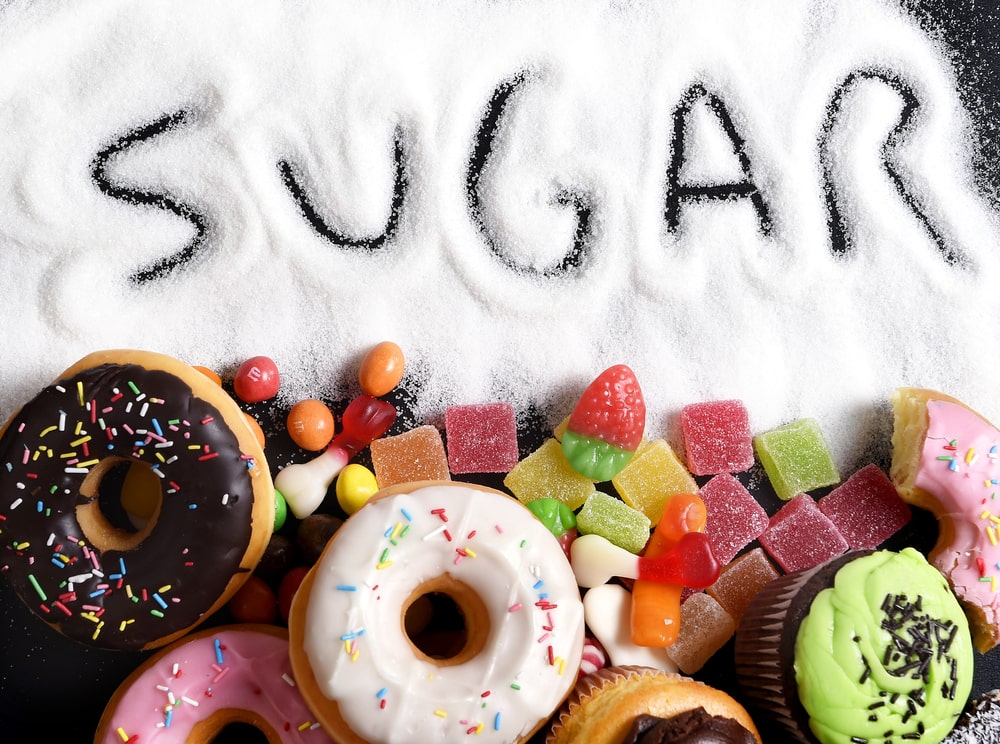How to Overcome Sugar Addiction?
What is sugar addiction? Sugar addiction is a measurable, physiological phenomenon that anyone can experience. It can make it difficult for many people to achieve and maintain their well-being. If you can’t decide whether your sugar tooth is your addiction and want to know how to overcome sugar addiction or habit, this blog will keep you well-informed on sugar addiction.
Why is sugar so addictive?

Sugar addiction can be either behavioral, psychological, or chemical. Behavioral sugar addiction is when one builds tolerance to sugar over time because of one’s habit of eating sugar after meals or at certain times of the day. Chemical sugar addiction is because of the release of dopamine that sugar brings. Dopamine is a neurotransmitter, a hormone that provides a pleasurable reward.
In many clinical studies, researchers have found that the sugar release of dopamine is similar to various drugs. The human brain’s reward pathway for sugar also gets weakened if one eats sugar regularly. This can also lead to a craving for sugar, and one consumes a large amount of sugary food over time and experiences the same amount of pleasure.
Hence, people seek to crave more (higher) quantities of sugary food carvings to achieve the same level of pleasure and satisfaction due to the development of addictive-like behaviors.
In many cases, sugar cravings in excessive consumption can be related to any emotional and psychological connection. Many people consume sugary treats for comfort and celebration and even take them for stress relief. This makes it a go-to option for coping with emotions. These emotional ties with sugar can make one addicted and make it harder for one to break this addiction.
Having any such sugar addiction? No worries, there are ways to combat it. Learn more about how to overcome sugar addiction.
Sugar Addiction Symptoms:

Here are the signs that one’s sugar habit might be a serious sugar addiction:
- Hiding about sugar habit– Despite being aware that intake of sugar is more, if one is not finding ways to cut it back and is instead hiding it, then one might have a sugar addiction.
- Can’t stop having more and more sugar to satisfy its craving- Such behavior can lead to the building of tolerance to sweets over time.
- Eating sugar after big meals- It is the number one sign of sugar addiction when one is always turning to sugar even if not physically hungry.
- Always craving for sweets- After a sugar binge, blood sugar levels will eventually drop and further cause more sugar cravings.
- Craving for salty foods- This is a sign that the body is not getting many nutrients. Thus, sugar addiction can result in nutrition deficiency.
- Tried quitting sugar intake but experienced unusual symptoms- Quitting on daily intake of sugars after meals or at certain times of the day may cause distress or withdrawal symptoms, indicating a sugar addiction.
- Eating sugar to soothe- If a sugar craving is thereafter any bad day or break-up to get emotional relief, it is a sign of sugar addiction.
- Eating sugar even after knowing its potential health consequences- This compulsive behavior is a sign of sugar addiction.
- Can do anything to eat something sweet- If having anything sweet is one’s priority, it’s a clear sign that one’s need for sugar is getting out of control.
- Having guilt about eating sugar- This may be a sign of an eating disorder and a sugar addiction.
If experiencing any of these signs of sugar addiction, go ahead with the execution of strategies known to how to overcome sugar addiction.
ADHD and Sugar Addiction:

It is a pervasive myth that sugar addiction can cause ADHD (Attention Deficit Hyperactivity Disorder) or worsen the symptoms of ADHD. As per a systematic review and meta-analysis of studies on the connection between ADHD and sugar, those who consume more sugar are more likely to have ADHD symptoms than others. But this doesn’t mean that intake of excess sugar would cause a high risk of ADHD.
To date, there is not much evidence collected to say how sugar impacts ADHD. However, there are some research theories. A leading theory is that ADHD symptoms worsen with nutritional deficiency and those who have a sugar-loaded diet tend to have less of nutrients. Another well-known theory is that excess sugar consumption is a consequence of ADHD rather than a cause.
That’s because there is severe dysregulation of the dopamine system in ADHD patients and sugar can activate the system. Thus, as a self-medicating behavior of ADHD patients, they consume more sugars to compensate for their low dopamine levels.
Even if sugar addiction or habit is not causing ADHD, it can still lead to many health issues such as tooth decay and heart disease. So, it’s worth it to cut back on sugar. This is possible by knowing how to overcome sugar addiction.
How to Stop Sugar Cravings?

To end your sugar craving, here are some ways:
- Go for a sugar detox diet: Switching to a sugar detox diet plan can help tame one’s sugar tooth and even help one lose weight. For breakfast, health experts recommend one have whole eggs, plain yogurt, nuts, and seeds. At lunch, a salad with different veggies, legumes, and healthy fats would be the best while at dinner one can have roasted vegetables with avocado or wild salmon and brown rice. All such food items can help curb sugar cravings.
- Don’t skip meals, especially the first meal of the day: By skipping meals, one can experience sugar cravings more often. On the other hand, having nutritious meals all day long can prevent one from getting hungry and craving sugars.
- Limit sugar exposure: The ways by which one can reduce their sugar intake like having oatmeal instead of breakfast cereal. Avoid having candies and instead, snack on dried fruits without added sugars. Not stocking the house with candies, cookies, and different sweets. Having only a dessert after dinner. Avoiding drinking sweetened drinks like soda and sports drinks. Reading the ingredients on the label of the food product for sugar before purchasing. Also, snacking on fresh fruits and using them for dressing food items instead of using artificial sweeteners.
How to overcome sugar addiction?

Finally, you are at the right place to get details on how to overcome sugar addiction! Here are some suggestions on how to fend off sugar cravings and manage eating habits.
- Focus on having a balanced diet and avoid having highly processed foods containing added sugars.
- Avoid starvation or staying hungry for prolonged periods.
- Take out time and plan a list of groceries to take from the market and stick to that. Do not get tempted to purchase sugar snacks at the grocery store. Buy only meal prep-friendly foods and healthy snacks.
- Perform exercise regularly to bust stress as high stress levels can also play a role in sugar cravings and addiction. Exercise will help reduce the ghrelin hormone levels and even help one take good sleep to reduce cravings. Yoga, Tai-chi, and light body stretches can also help.
- Take proper rest and sleep well at night. A good night’s sleep is crucial to keep the levels of ghrelin hormone low. Ghrelin is a hormone that sends a message to the brain about being hungry.
- Drink plenty of water to kick a sugar habit.
- Consider food journaling to monitor sugar intake and manage it accordingly.
- Consult a primary care doctor to know if your sweet tooth is taking over your life and resulting in sugar addiction. The doctor may tell when there is a need for medical intervention to address the chemical reactions that fuel the craving.
- The triggers that cause sugar cravings, like situations, emotions, or habits that trigger, must be identified. This can help one to take better control of their sugar cravings.
- One can use natural sweeteners like stevia, monk fruit, or erythritol if one needs a sweet taste, as they have fewer calories and do not spike blood sugar levels like regular sugar.
- One must pay attention to what they eat. Mindful eating helps one appreciate the flavors and textures of their food and makes one less likely to overindulge into sugary treats.
- Many artificial sweeteners can trigger sugar cravings, and they may not be beneficial for breaking the addiction to the sugar cycle.
- One must include protein and healthy fats in their diet. They help stabilize blood sugar levels, keep the gut feeling full for longer, and reduce the desire for sugary foods.
- One must look for healthier alternatives to their favorite sugary treats. One can replace ice cream with frozen yogurt or sugary cereal with oatmeal topped with fruit.
FAQs:
Can you be addicted to sugar?
You might be choosing to have sweetened foods and drinks often to treat yourself or while emotionally eating. This might make you feel that you have developed an addiction. But in reality, you might develop a hard-to-break sugar habit. There is very little evidence that one has sugar addiction in the same way as tobacco, cocaine, or alcohol. If you feel you have a sugar addiction, go through our blog on How to overcome sugar addiction blog.
How long does it take to overcome sugar addiction?
Breaking a sugar habit may take about 3-4 weeks. The time taken varies for every sugar addict and depends upon how to overcome sugar addiction.
How to overcome sugar addiction naturally?
A few suggestions can help to naturally break the sugar addiction. One can keep sugary foods and beverages out of your reach. One can sweeten foods on their own instead of consuming packaged sugar food items. Avoid having any food products that contain sugar of any form as an ingredient. Do not skip breakfast as it could make one crave sugar. Try out some natural herbs such as cinnamon and tulsi to combat sugar cravings.
Is sugar more addictive than cocaine?
No. Research studies reveal that sugar addiction is the same as that of cocaine. The increased body of research tells us that intake of excess sugar can alter brain chemistry just as some street drugs like cocaine do. This could compel an individual to repeat consuming the substance despite knowing its harmful consequences. If having a sugar addiction, switch to the section “How to overcome sugar addiction”.
Why do addicts crave sugar?
People who have an addiction to a substance or are recovering from substance use disorders often have intense sugar cravings. There are various reasons why addicts prefer sugar eating. One could be that addicts have reduced blood glucose levels. Sugar-loaded foods and beverages are more pleasurable to eat than nutritious foods, which is why they are preferred by addicts during their recovery. If you want to know how to overcome sugar addiction, scroll up.
References:
- https://www.healthline.com/nutrition/too-much-sugar
- https://www.addictioncenter.com/drugs/sugar-addiction/
- https://www.webmd.com/diet/ss/slideshow-sugar-addiction
- https://www.goodrx.com/well-being/behavioral-addiction/how-to-break-sugar-addiction
- https://www.health.harvard.edu/staying-healthy/how-to-break-the-sugar-habit-and-help-your-health-in-the-process

